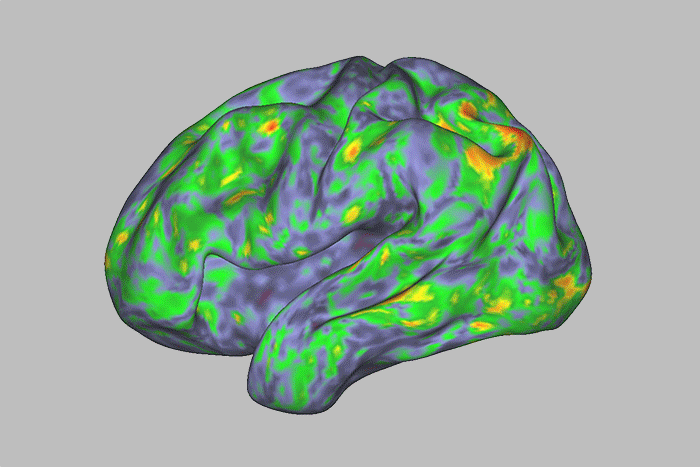New Research
Taco-Shaped Creature Had a 'Major Edge' in Evolution—and 30 Pairs of Spiny Legs
This shrimp-like arthropod was among the first to have a mandible, and it used a complex feeding mechanism during the Cambrian explosion, according to a new study
Scientists Discover 'Dark Oxygen' on the Ocean Floor Generated—Surprisingly—by Lumps of Metal
Researchers found that electric currents from polymetallic nodules are behind this alchemy—the same minerals that deep-sea miners are targeting
The Smell of Human Stress Leads Dogs to Make More Pessimistic Decisions, Study Suggests
Canines that smelled the sweat of anxious people were less likely to approach a bowl that might have contained food, indicating humans' emotions can affect dogs' behavior
The 'World's Loneliest Plant' Could Soon Find a Mate With a Little Help From A.I.
The only known wild Wood's cycad was discovered in 1895, and it has since been cloned into many male trees. Now, researchers are scouring a forest in South Africa for an elusive female specimen
Thirteen Sharks Test Positive for Cocaine Off the Coast of Brazil
All of the wild Brazilian sharpnose sharks tested in a new study had the drug in their bodies, but many questions remain about cocaine's effects on aquatic creatures—and the humans who eat them
Chimpanzees Take Turns in Fast-Paced Conversations, Just Like Humans Do
A new study finds the average chimpanzee response time in gestured conversations is 120 milliseconds, which isn’t that far from the human average of 200 milliseconds
Geologists Uncover Remnants of Earth’s Mantle That Have Lasted Over 2.5 Billion Years
New research suggests that a discrepancy in rocks shows they endured extreme heat, and reveals more about an ancient part of our planet’s history
Common Blood Thinners Could Combat Snakebites, Preventing Tissue Damage and Amputations, Study Finds
An estimated 400,000 people per year are permanently disabled because of snake venom, which can cause lesions and necrosis at the bite site
See How the Brain Responds to Psychedelic 'Magic Mushrooms'
A new study mapped large, temporary changes in brain areas related to introspection and one's sense of self, after participants took a dose of the drug psilocybin
Amid Its Volcanic Eruption, Pompeii Was Also Rocked by an Earthquake, Study Suggests
Researchers uncovered skeletal remains of two people in the ancient city that seem to have been killed by a building collapse caused by seismic activity
Was This Giant, Armadillo-Like Animal Butchered by Humans in Argentina 21,000 Years Ago?
The creature's bones show evidence of cutting with stone tools, adding to a series of findings that suggest humans were present in the Americas earlier than thought
Scientists Find an Underground Cave on the Moon That Could Shelter Future Explorers
Such caves could serve as lunar bases during upcoming missions, protecting astronauts against cosmic radiation and extreme temperatures
Spacesuit Prototype Turns Pee Into Drinking Water
The system is inspired by the stillsuits for collecting moisture in the science fiction epic <em>Dune</em>
Did Plague Cause the Mysterious Collapse of Europe's Early Farmers 5,000 Years Ago?
A new study finds widespread DNA evidence that an ancestor pathogen of the Black Death helped bring about the end of an agricultural society responsible for megalithic tombs and monuments, like Stonehenge
3D DNA Preserved for 52,000 Years in Freeze-Dried Woolly Mammoth Remains
For the first time, researchers have mapped ancient genetic material in unprecedented detail
Astronomers Spot Rare, Mid-Sized Black Hole in Our Galaxy
The black hole, if confirmed, is in the star cluster Omega Centauri, about 17,700 light-years away, and it could hold lessons about how such structures are formed
Gut Microbes Could Help Diagnose Autism, Study Suggests
While more research is needed, scientists detected specific differences between the gut microbiomes of children with and without autism
This Nearby Exoplanet Is Hot, Dangerous—and Smells Like Rotten Eggs
Located about 64 light-years away from Earth, the world is the first place astronomers have detected hydrogen sulfide outside our solar system
New Bionic Leg and Surgical Procedure Allow People to Walk With More Control After Amputations
The experimental surgery connects two muscles in the legs of people with below-the-knee amputations, allowing them to control a prosthetic limb with their brain
Ancient DNA Unravels the Mysteries of the Dingo, Australia's Wild Dog
Researchers dove into thousands of years of evolutionary history, revealing new insights about the iconic, though sometimes vilified, canines
Page 1 of 247
:focal(350x273:351x274)/https://tf-cmsv2-smithsonianmag-media.s3.amazonaws.com/filer_public/cb/d2/cbd26d57-53f0-46b1-80ec-6ddd33adfd75/low-res_odaraia_life_reconstruction_by_danielle_dufault.jpg)
:focal(1969x1322:1970x1323)/https://tf-cmsv2-smithsonianmag-media.s3.amazonaws.com/filer_public/c5/ca/c5ca9228-e647-4dde-8989-dffcfc211b88/gettyimages-1234090606.jpg)
:focal(1060x712:1061x713)/https://tf-cmsv2-smithsonianmag-media.s3.amazonaws.com/filer_public/d4/37/d43735f1-067f-4070-b186-7cc2999185b0/gettyimages-1463449494.jpg)
:focal(700x500:701x501)/https://tf-cmsv2-smithsonianmag-media.s3.amazonaws.com/filer_public/d2/49/d2492998-8601-4205-b203-48a7835f5802/laura.jpg)
:focal(800x602:801x603)/https://tf-cmsv2-smithsonianmag-media.s3.amazonaws.com/filer_public/d5/14/d514ed7e-999b-43ca-bc53-bf78237f9f04/image2_3.jpeg)
:focal(3000x2000:3001x2001)/https://tf-cmsv2-smithsonianmag-media.s3.amazonaws.com/filer_public/15/79/15798be8-6e39-4b96-a2a6-ef5bcfb98f79/aso_3241.jpg)
:focal(1004x1243:1005x1244)/https://tf-cmsv2-smithsonianmag-media.s3.amazonaws.com/filer_public/e5/a4/e5a47313-945c-40c7-82a9-f72cb9e71a5b/a2_-_elizabeth_cottrell_-_hly102-40-56__5.jpg)
:focal(2589x1726:2590x1727)/https://tf-cmsv2-smithsonianmag-media.s3.amazonaws.com/filer_public/78/c1/78c1bfdc-32e7-46fa-9065-5292db955971/gettyimages-200352535-001.jpg)

:focal(2784x1750:2785x1751)/https://tf-cmsv2-smithsonianmag-media.s3.amazonaws.com/filer_public/bf/b7/bfb7a4ba-e966-420e-b88e-0e19f5fa153b/gettyimages-170423945.jpg)
:focal(1824x1372:1825x1373)/https://tf-cmsv2-smithsonianmag-media.s3.amazonaws.com/filer_public/01/b5/01b5dcee-a63d-4795-93fa-19327de9a2a4/esclerocalipto.jpg)
:focal(400x400:401x401)/https://tf-cmsv2-smithsonianmag-media.s3.amazonaws.com/filer_public/82/2f/822fb0dd-f152-4dc2-a855-ce6b8b5f5224/pia13518orig.jpg)
:focal(350x343:351x344)/https://tf-cmsv2-smithsonianmag-media.s3.amazonaws.com/filer_public/72/d6/72d6d2f3-0eaf-43ac-8b23-d5d9f4119c5f/low-res_frontiers-space-technology-maximum-absorbency-garment-hold-credit-claire_walter.jpg)
:focal(992x746:993x747)/https://tf-cmsv2-smithsonianmag-media.s3.amazonaws.com/filer_public/17/7d/177d0b16-2801-4319-8382-bd55829a1335/the-plague-may-have-ca-2.jpg)
:focal(600x400:601x401)/https://tf-cmsv2-smithsonianmag-media.s3.amazonaws.com/filer_public/9d/03/9d03e8f0-5b0e-4445-b90a-69b96ccf49b0/imrs_1.png)
:focal(560x560:561x561)/https://tf-cmsv2-smithsonianmag-media.s3.amazonaws.com/filer_public/4d/05/4d051c14-9155-4062-8244-aa19edabf81b/hubble-omegacent-crop-stsci-01j1x1rzvdzs3hv0s5vbhc7x0r.webp)
:focal(2736x1824:2737x1825)/https://tf-cmsv2-smithsonianmag-media.s3.amazonaws.com/filer_public/7c/26/7c269289-e6e1-4c75-b388-1141615f94af/gettyimages-1895741978.jpg)
:focal(3500x1983:3501x1984)/https://tf-cmsv2-smithsonianmag-media.s3.amazonaws.com/filer_public/1e/06/1e06b8cf-be0d-4df1-b7ab-53283700323d/hd_189733bs_atmosphere.jpg)
:focal(450x300:451x301)/https://tf-cmsv2-smithsonianmag-media.s3.amazonaws.com/filer_public/91/51/91514c4b-cd4f-45c9-84ee-c602be15819d/herr-nature-medicine-image-01_0.jpg)
:focal(1067x701:1068x702)/https://tf-cmsv2-smithsonianmag-media.s3.amazonaws.com/filer_public/f4/d0/f4d0fb37-4f26-455a-a8c4-ada959fa2a8a/gettyimages-80254810.jpg)